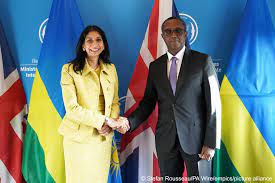Italy: Parliament to ratify Albania deal to process asylum seekers

Rome: Both of Italy’s houses of parliament will be given the chance to ratify the country’s new deal to process asylum seekers in Albania. The motion was approved after a debate in the lower house.
Italy’s Foreign Minister Antonio Tajani spoke to Italy’s lower house on Tuesday (November 21), explaining the Italy-Albania deal to process asylum seekers in more detail, and promising that the deal would be presented as a DDL (proposal of a law) and that both houses would have the chance to ratify it before it proceeds.
In his long speech to the lower house, Tajani reminded parliamentarians that other similar deals with countries like Libya had not been subject to the same ratification process. Originally the Italian government said that the Italy-Albania deal didn’t need to be either, since it was not a treaty and only treaties needed to be ratified by parliament.

However, in what the opposition has dubbed a “complete U-turn,” two weeks after the Italy-Albania deal was signed, Tajani has announced that it would be presented as a subject for debate by parliamentarians. The government hopes that the debates and ratification process will be “as quick as possible,” since the deal is meant to begin in just a few months, by spring 2024.
Fighting the traffickers is “an absolute priority” for the Italian government, said Tajani during his speech to parliament. Referring to the death of a two-year-old girl during a rescue operation on Monday (November 20), Tajani said “we won’t and shouldn’t get used to these kinds of tragedies that are unfolding along our coasts.”
He proposes that the Italy-Albania deal is just “one additional instrument” to help Italy manage migration. Tajani said that Italy has worked hard to make migration a central tenet of EU debate, and says that Italy and other members of the bloc are all working hard to “stop irregular migration, fight traffickers and strengthen the external borders of the EU.”
Although Tajani admitted that the deal was “no panacea”, he said that Italy had “deep and historic ties with Albania” and already had joint teams to stop the trade in drugs and migrants. For the benefit of the parliament, Tajani outlined once again that the deal would be entirely paid for by Italy and was expected to cost €16.5 million initially. This would cover the two centers, one at the port and one about 30 kilometers away.
The initial center at the port will be where people are registered and fingerprinted. They will then be moved to the reception center, where they will have their asylum requests examined. Anyone whose request is refused would be repatriated from there.
This is no offshoring deal, said Tajani, disputing the accusations that it was “Italy’s Guantanamo” or anything like the UK-Rwanda deal. The centers will be entirely staffed by Italian personnel, be managed under Italian law, and they will come under the jurisdiction of the Italian courts, said Tajani.
Italy’s foreign minister underlined that “no vulnerable people, women or children” would be sent to these centers. It will be exclusively to process the asylum requests of non-vulnerable migrants from safe countries, explained Tajani, or those who have already had one claim refused, or people waiting for repatriation.
There will never be more than 3,000 people in the centers at any one time, promised Tajani. Italy will pay Albania for police patrols outside the centers and for any hospital visits that are required. Tajani also assured parliamentarians that all rights to healthcare and safety would be respected and that the only asylum seekers brought to Albania would be by Italian official boats. NGO rescue ships would not be disembarking people in Albania.
Tajani said that the European Commission had already confirmed that the agreement did not violate EU law, since, as Tajani explained quoting EU Home Affairs Commissioner Ylva Johansson, the processing will follow Italian law which is fully in line with European law.
Several MPs in the debate, including Minister Tajani referenced the fact that the German chancellor had said they would be following the agreement closely and thinking about similar models for their country. According to Tajani, the German Chancellor Olaf Scholz said that since Albania will soon be part of the European family, referring to Albania’s European accession process, processing asylum seekers in Albania was about “solving challenges within Europe” and not offshoring.
Scholz, speaking in Malaga recently, said that the whole bloc was looking to “reduce irregular migration” and said he thought there should be more deals struck like the EU-Turkey 2016 deal, to help Europe manage migration.
Nearing the conclusion of his speech, Tajani underlined that any exceptions to adhering to the rule of international law would be straight out “impossible”. Using the Albania agreement as a model, Tajani said the Italian government was seeking to conclude or extend similar deals with other friendly countries, transit countries and countries of origin.
Tajani promised that the Italian government would also increase the number of legal pathways into Italy. He said in parliament that the new work permits for migrant workers had already been increased to about 150,000 per year from this year to 2025, compared to 82,000 in 2022.
At the end of the debate in parliament, a majority of 189 to 126 voted to allow the proposal to continue its passage and be put forward as an official proposal of law (DDL), to be examined and ratified by both houses.
However, the law was not without its critics. During the debate, Riccardo Magi from the Più Europa (More Europe) party said that the deal “did nothing but increase uncertainty and would take away the fundamental right to personal liberty” of people who may be detained under the deal. He added that he didn’t believe that even the ministers proposing the deal believed it would really be doable.”
On November 20, Amnesty International and 35 other NGOs, which together form the TAI (Tavalo Asilo e Immigrazione – a forum for the discussion of asylum and immigration) have also criticized the deal, calling it “illegitimate” and saying it should be “revoked.”
The TAI held a press conference on Tuesday (November 21) where they reiterated that in their opinions, the deal violated international obligations and laws. They said that just like the deal with Tunisia, it was an attempt to “externalize the borders and the right to asylum.”
According to a press release from the TAI, the Italian migration system is “in chaos and continuously violates the law and the rights of welcome and asylum” that under international law they are forced to offer. TAI accuses the Italian government of “making sure it implements practices in the field which just produce emergencies and discomfort.”
The TAI says that the Italy-Albania deal “risks seriously violating human rights.” They say that once those people are on an Italian boat, they come under Italian jurisdiction, so they can’t then be transferred to another state to have their asylum requests examined.
The deal, says TAI, goes against the principle of non-refoulement, whereby a person cannot be sent back to a land where they could knowingly be put in danger. The deal also allows for people to be detained illegitimately, claims TAI.





